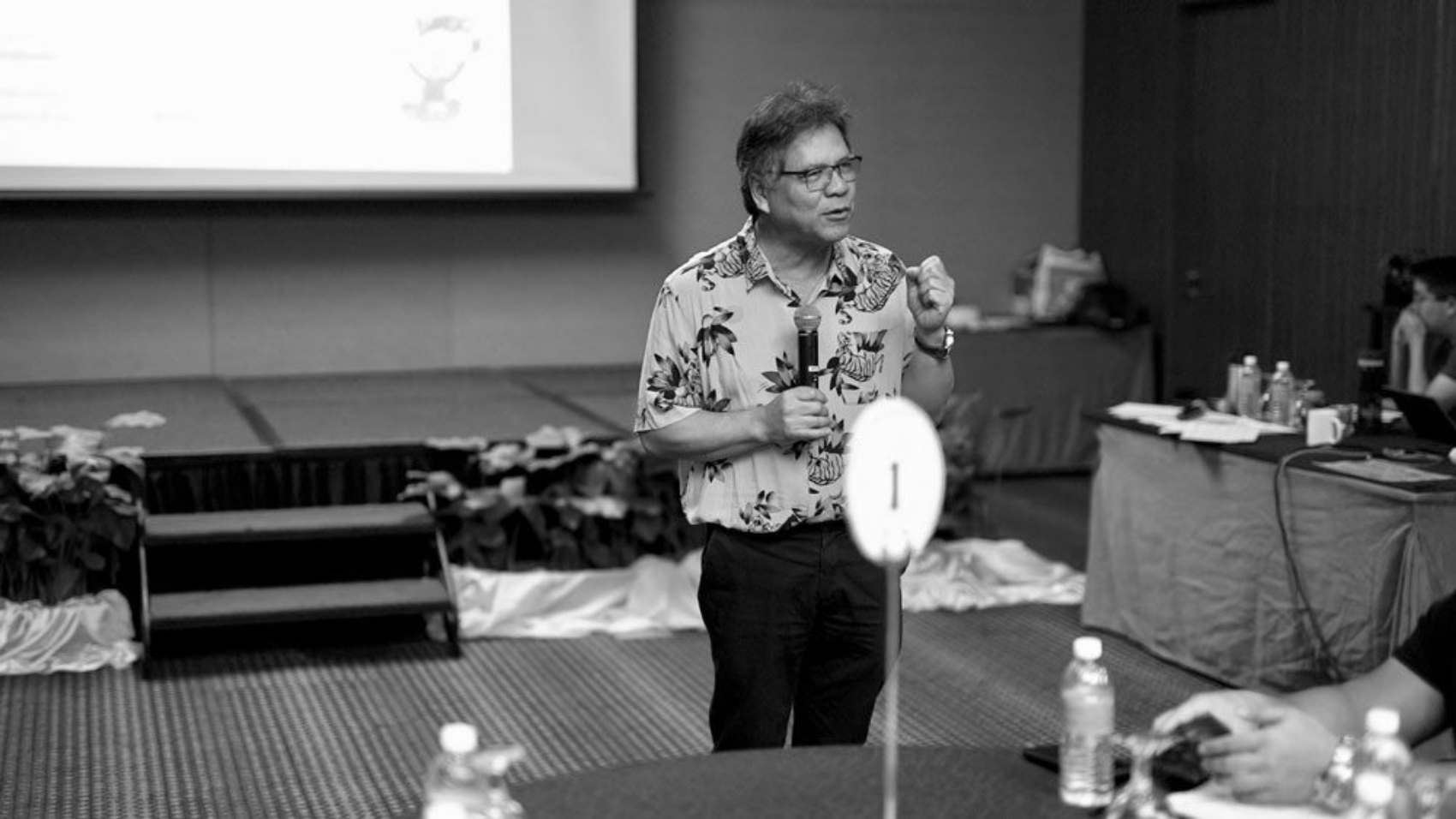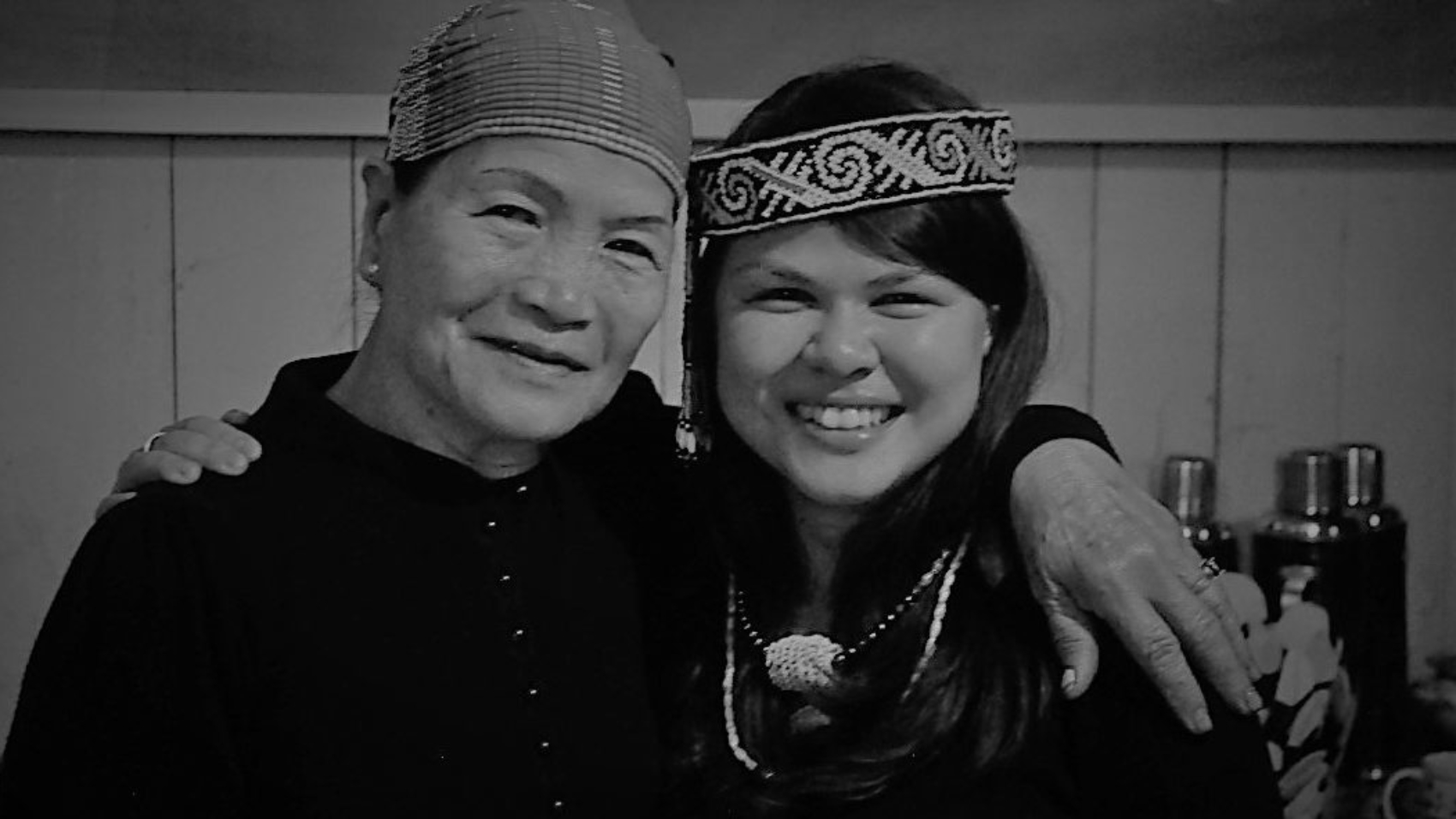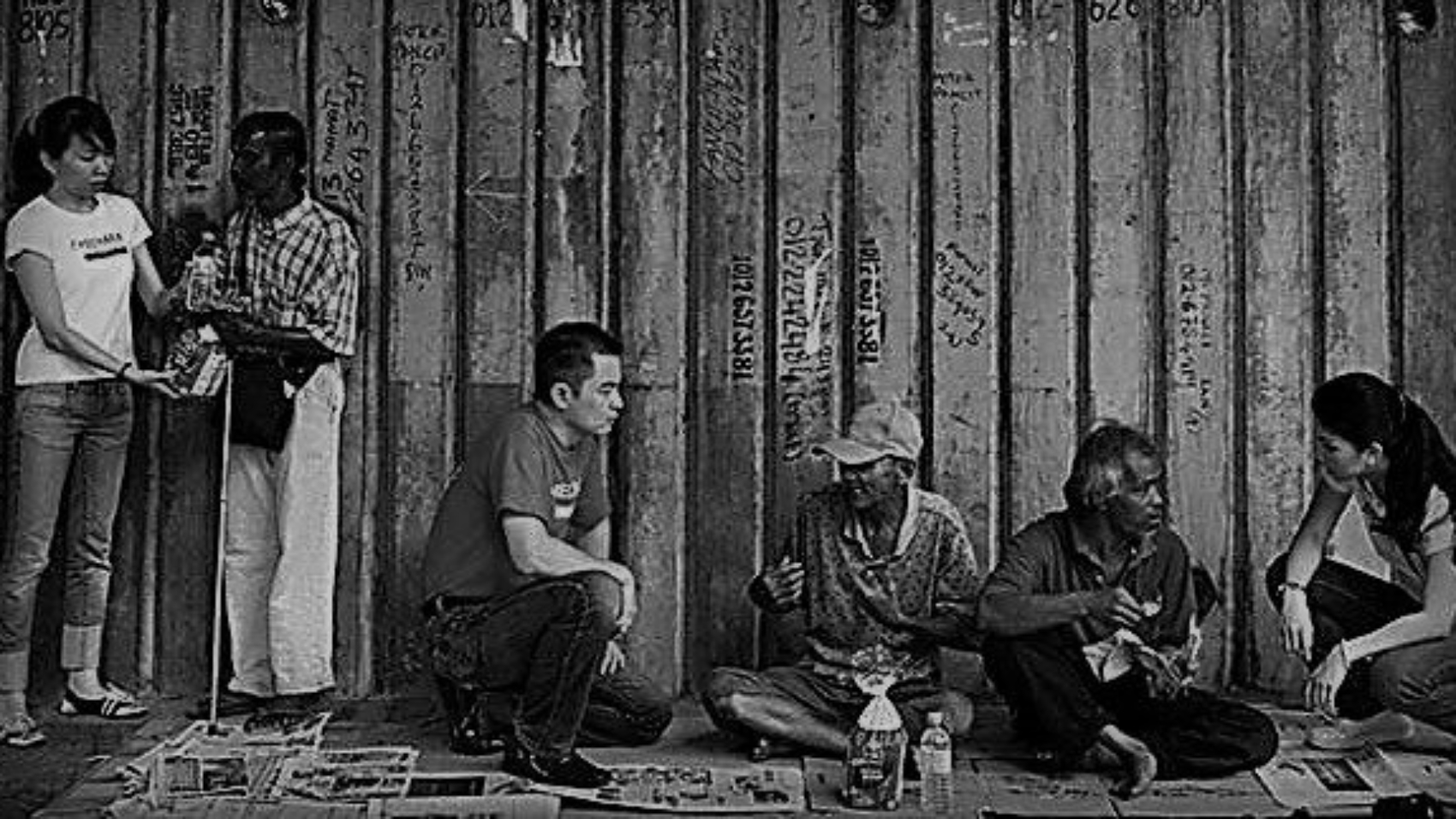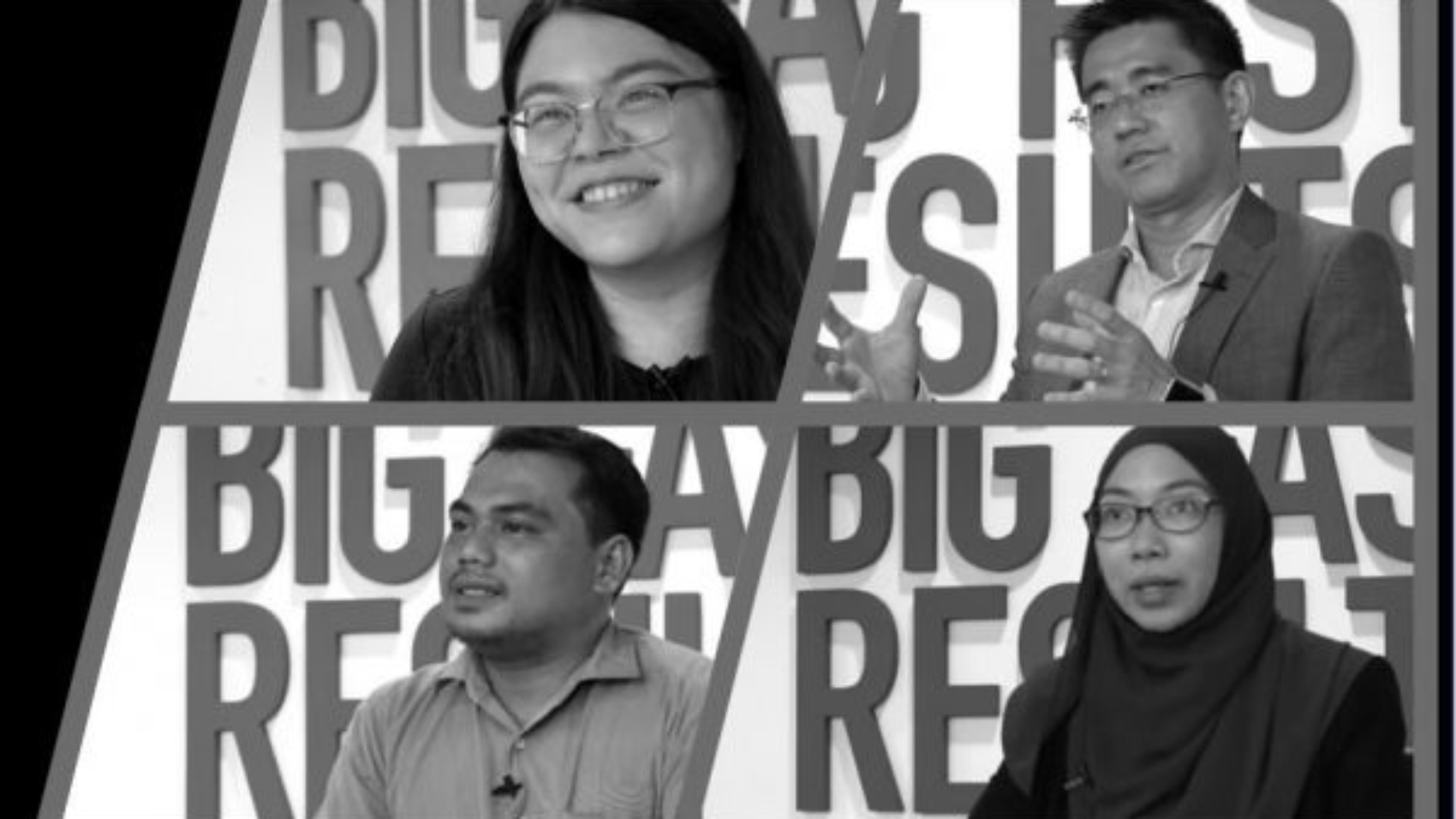As the old adage goes, ‘one step back, two steps forward’. Watch what went down at PEMANDU Associates’ 2019 Away Day.
Why Transformations Fail
Transformation is often on the agenda of many governments and businesses. And with the plethora of talents nestled within these organisations, it begs the question: why do some pursuits of transformation miss the mark?
Fear of the road less travelled.
 It would be stretching the truth to say that all roads to transformation are wide, open and free from blockages. The work that PEMANDU Associates engages in is deeply rooted in their Big Fast Results (BFR) Methodology – 8 Steps of Transformation© to deliver gargantuan results in as short a timeframe as possible. But often, the greater the destination, the tougher the journey.
It would be stretching the truth to say that all roads to transformation are wide, open and free from blockages. The work that PEMANDU Associates engages in is deeply rooted in their Big Fast Results (BFR) Methodology – 8 Steps of Transformation© to deliver gargantuan results in as short a timeframe as possible. But often, the greater the destination, the tougher the journey.
This is why the methodology has to be coupled with a paradigm shift of what the firm calls “The Being” by instilling an intensive discipline of action within the organisation committed to the pursuits of transformation.
As the late Leo Burnett, founder of one of the world’s leading advertising agencies, once said “reach for the stars – you may not get one, but at least you won’t come up with a pile of mud either.” Businesses and governments must be willing to take the road less travelled by setting Olympic-sized targets. And in doing so, must be willing to exercise some grit in putting them into motion.
One says left, another says right.
Another hindrance to any transformation journey is a lack of employee engagement, insufficient management support, poor or even non-existent cross-functional collaborations and a lack of accountability within the organisation.
In a particular project that PEMANDU Associates embarked on, the firm was tasked with helping them identify new revenue streams to boost their profitability. However, its attempt at transformation appeared hamstrung at the start. While the programme obtained the buy-in of its top leadership, other business units within the group were unfortunately more difficult to win over. From their perspective, however, PEMANDU Associates understood that their lack of commitment to the endeavor stemmed from their view that certain aspects of their business were not triggering any red flags and thus, did not warrant transformative action – a classic case of “if it isn’t broken, don’t fix it”.
Alignment is imperative. And one of the ways that PEMANDU Associates has successfully achieved this is through its Lab process. This entails getting key stakeholders across different units into a room for a period of six to eight weeks to collectively diagnose key issues and subscribe strategic enablers to move forward.
For the firm’s public sector clients, this process involves key players from the private sector as well, for their perspectives. The result is cross-functional alignment that sets the scene for a collaborative journey ahead.
A lack of detail in delivery
 Many governments and businesses alike have beautiful targets. But these often fall apart due to an absence of detailed action plans to move the needle. The level of detail required does not stop at setting stringent timelines of delivery but extends to tracking results meticulously and frequently.
Many governments and businesses alike have beautiful targets. But these often fall apart due to an absence of detailed action plans to move the needle. The level of detail required does not stop at setting stringent timelines of delivery but extends to tracking results meticulously and frequently.
For PEMANDU Associates’ private sector clients, a practice they employ religiously is developing segmented profit and loss statements. For example, at its most basic level, if you are an airline, it means rigorously tracking yield per flight. This will help you identify specific pain-points to prioritise business efforts.
Following our experience on the aforementioned project, we found that for transformations to take root, it is crucial to establish laser focus on identifying the fundamental issues to enable targeted solutions in being achieved.
Discomfort with being uncomfortable
The frameworks outlined above share one commonality – tough work. Organisations need to be comfortable with discomfort from end-to-end on their transformational pursuits. But the good news is that with the right structures in place, we can at least be better equipped to stay the course in playing what the firm calls the “Game of the Impossible”.
Recruitment in the Digital Age
Seeing to believe
The art of recruitment has evolved throughout the years.
 Before the internet and social media, the modus operandi for companies was to put out a piece of advertising with a nice headline, coupled with requirements for the job. Then, hope that qualified individuals would find their ad in the sea of job postings nestled in the pages of local newspapers or trade magazines.
Before the internet and social media, the modus operandi for companies was to put out a piece of advertising with a nice headline, coupled with requirements for the job. Then, hope that qualified individuals would find their ad in the sea of job postings nestled in the pages of local newspapers or trade magazines.
In this digital age, where authenticity and real experiences are favoured over mere rhetoric, there is a need for companies to re-imagine their approach to recruitment. Gone are the days where simply claiming that company X is a good place to work would be good enough to lure in a resume. Today’s candidates are more interested in real stories. And they want them to come from the people working in the company itself.
However, despite studies that reveal a 34% increase application rate* for companies that use the videos as a recruitment tool, some companies still err on the side of caution, seeing the production of a good video as “unnecessary spending”. No doubt, investing in a recruitment tool comes at an expense. However, the cost of replacing an employee can go up to four times their annual salaries, with bad recruiting costing companies over $50,000 on average.**
Storytelling the way forward
DIALOG – a leading oil and gas service provider, saw the need for a recruitment video. The challenge? They wanted this to double as a corporate video.
Sticking to a steadfast belief that every good story deserves to be told authentically, the team at COMMUNICATE by PEMANDU set out on a different approach to dig up compelling stories and experiences from DIALOG’s very backbone – their staff.
But in order for the video to double-hat as a corporate video, the team needed to give DIALOG a brand proposition to anchor their staff’s stories on. What was immediately clear in the preliminary research was that the company demonstrated a penchant for venturing into new business opportunities. This pointed to an ironic comfort with being outside of their comfort zone. And thus, emerged the guiding theme for the video.
 With that, COMMUNICATE sought to tell the stories of people who, in the same spirit, embarked on a journey of personal transformation by getting out of their comfort zones. Each of these stories revealed how DIALOG had given them the space and opportunities to do things they would have never imagined.
With that, COMMUNICATE sought to tell the stories of people who, in the same spirit, embarked on a journey of personal transformation by getting out of their comfort zones. Each of these stories revealed how DIALOG had given them the space and opportunities to do things they would have never imagined.
It helped that many had stories to tell from experiences beyond the confines of their office cubicles. Team COMMUNICATE wanted these experiences to shine through to excite potential candidates and drive home the theme of exploration. To do so, they spent two days documenting some of the off-site work that our protagonists were involved in.
Not wanting to sugar-coat, many of these stories involved humorous quips, for example, one member of staff who when describing a particular off-site experience, found himself asking “what am I doing here?”
The end-product was an amalgamation of experiential stories peppered with honest accounts from people who know the company best. All to paint a clear picture for potential candidates of what a career with DIALOG could look like, but more importantly, to make known the inevitable yet transformative opportunities to explore new terrain beyond the confines of comfort – the very lifeblood of all of DIALOG’s successes.
Source: *TalentLyft , **Collingwood Search
Where to, Malaysia Baharu?
May 9, 2018 was a historic day for Malaysia. Malaysians collectively decided a bold change was needed. And so, after more six decades into its independence from British rule and as a sovereign nation, a new government took seat in office. The change not only signalled a significant shift in political ideology and the transformation of the country’s administration, but also the direction of its economic development.
The Malaysia Plan, strategically crafted and executed since 1966, and now in its 11th edition have guided Malaysia’s development for more than five decades. The country had over the years evolved from a mining and agriculture-based economy to one that is manufacturing and export-oriented, as well as more diversified with a push towards the services and high-income sectors. Its affirmative action bumiputera agenda has also played a vital role in its growth trajectory as the government sought to ensure equitable distribution of wealth for all Malaysians.
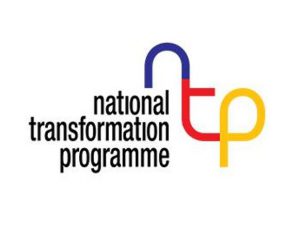 Cognisant of the need to radically transform its economic and social fabric, the then government, embarked on a National Transformation Programme in 2009 to focus on delivering socio-economic improvements to put Malaysia firmly on the path out of the middle-income trap and propel it into a high-income nation status.
Cognisant of the need to radically transform its economic and social fabric, the then government, embarked on a National Transformation Programme in 2009 to focus on delivering socio-economic improvements to put Malaysia firmly on the path out of the middle-income trap and propel it into a high-income nation status.
A decade has since passed.
The transformation programme has yielded some very positive outcomes. A case in point: as at 2017, the country’s gross national income (GNI) per capita had increased to US$9,650 (RM39,565) from US$7,640 (RM31,324) in 2009, just US$2,576 (RM10,562) short of the World Bank’s high-income threshold of US$12,236 (RM50,168). And in doing so, Malaysia has moved out of the middle-income trap.
Is Malaysia economic growth still on track?
Economic analysts at large are awaiting the release of the Malaysian Economic Report by the Economic Planning Unit, which is expected to be available to the public at the end of the first-quarter 2019. This report will essentially provide the complexion of Malaysia’s growth prospects. Economists also maintained that despite expectations that Malaysia may miss its 2020 target for a balanced budget, the country’s economy remains robust and fundamentally sound, with its A-rating for sovereign debt intact and the labour market also envisaged to remain stable. Malaysia also registered a 350% increase, from RM14 billion in 2017 to RM49 billion in 2018 in foreign direct investments (FDI) within the first nine months of 2018 compared with the same period in 2017.
Malaysia marches the Industry4WRD
In spurring future growth, the new administration has also worked to introduce a national policy framework on the fourth Industrial Revolution. This is developed to promote innovation, creativity and competitiveness in embracing the intensification of the digital revolution.
In the mid-term review on the 11th Malaysia Plan, the government aims to intensify the adoption of Industry 4.0 related technologies.
The policy provides the action plan in catalysing the adoption of Industry 4.0 related technologies to increase productivity and competitiveness of the manufacturing sector. Against this backdrop, the country is poised for a continued ascent on the value chain.
Malaysia, according to Datuk Darell Leiking, Minister of International Trade and Industry, will be meeting these challenges head-on with the implementation of the National Policy on Industry 4.0 – Industry4WRD, with the endeavour to incentivise, implement and facilitate digital transformation of the manufacturing sector and its related services.
The recent 2019 Budget had provisioned several incentives to aid the industries along this journey, such as the RM2 billion fund under Services Sector Guarantee Scheme (SSGS) accorded to small and medium-sized enterprises (SMEs) that invest in automation and modernisation. Under this scheme, the government will also provide financing guarantee of up to 70%.
![]() An Industry Digitalisation Transformation Fund, which is a subsidy allocation amounting to RM3 billion has also been approved to promote the adoption of artificial intelligence amongst the industries. The Malaysian Investment Development Authority (MIDA) is also taking an active role through its High Impact Fund by facilitating a matching grant to promote greater research and development (R&D), international certification and standards, as well as modernisation activities amongst the industry.
An Industry Digitalisation Transformation Fund, which is a subsidy allocation amounting to RM3 billion has also been approved to promote the adoption of artificial intelligence amongst the industries. The Malaysian Investment Development Authority (MIDA) is also taking an active role through its High Impact Fund by facilitating a matching grant to promote greater research and development (R&D), international certification and standards, as well as modernisation activities amongst the industry.
These measures are expected to significantly boost the government’s efforts to position Malaysia as a strategic partner for smart manufacturing, primary destination for high-technology industries and total solutions provider for manufacturing sector and related services in the region.
As Leiking put it, Industry4WRD will pave the way for enhanced productivity, job creation and the establishment of a high-skilled talent pool for the manufacturing sector, and ultimately contribute to the economic prosperity and societal well-being of the nation. The Ministry of International Trade and Industry has been allocated RM210 million over the course of three years between 2019 to 2021 to take on the Industry 4.0 agenda.
The elephant in the room
Meanwhile, Dato’ Sri Mustapa Mohamed, the former Minister of International Trade and Industry and current Member of Parliament for Jeli in Kelantan, raised three pertinent points for the country to cope with as it enters the era of New Malaysia. The first, as Mustapa put it, is to redefine the bumiputera agenda to make it a more inclusive policy. “We must find a balance between the need to continue promoting the bumiputera agenda while ensuring wealth distribution among other races. There is a need for us, as Malaysians, to sit down and search for a national consensus. There’s the elephant in the room,” he said at the Youth Economic Forum held in Kuala Lumpur last year.
![]() He also noted the need to reduce the brain drain and for more job creation. Apart from stimulating the economy to spur employment, Mustapa also stressed on the need for political stability, key institutional reforms and the eradication of corruption to instil and entrench investor confidence in the country. He also said the government must be conservative in fiscal spending, highlighting the need to adjust to new economic realities. This, as he cautioned, was not only due to the country’s debt position, but also its shortfall in income with the removal of the Goods and Services Tax (GST).
He also noted the need to reduce the brain drain and for more job creation. Apart from stimulating the economy to spur employment, Mustapa also stressed on the need for political stability, key institutional reforms and the eradication of corruption to instil and entrench investor confidence in the country. He also said the government must be conservative in fiscal spending, highlighting the need to adjust to new economic realities. This, as he cautioned, was not only due to the country’s debt position, but also its shortfall in income with the removal of the Goods and Services Tax (GST).
Dr. Azem Fazwan Ahmad Farouk, an associate professor and director at the Centre for Policy Research and International Studies of Universiti Sains Malaysia, observed that we are Malaysians precisely because we can maintain our ethnic, cultural and religious diversity. In conceptualising a Malaysia Baharu, we should begin from the learning, retain the good, innovate the new, apply, and not hastily throw the baby out with the bath water.
Confronted with these realities, Malaysia may find itself at yet another crossroad. However, with acute learnings and lessons from the past 60 years, the new government does have their work cut out for them. The hope is that policies and regulatory controls remain both progressive and inclusive, as the country seeks to fulfil its potential as a globally competitive, sustainable and inclusive economy with opportunities for all.
Transformation on the Street: Facilitating Empowerment and Sustainability In A Rural Setting – A Project WHEE Perspective
Rhonwyn Hagedorn, a little lady with a big heart for the people of Bario. Channeling that love towards teaching and developing the community there, she hopes to open up new means of generating income for the “land of a hundred handshakes”.
Top Tips on New Year’s Resolutions from a Man Who Realises Them for a Living
New Year’s resolutions. Everyone makes them. Few keep to them.
PEMANDU Associates’ CEO and President, Dato’ Sri Idris Jala has built a career on turning around companies and helping governments to deliver on their promises. In between his business travels, we caught up for a quick chat to get his take on what makes a good resolution and how best to keep to them.
What are your New Year’s resolutions for 2019?
In December 2018, my team and I conducted an in-depth reflection of the “good, the bad and the ugly” of the past year. Based on this, we have set ourselves some “impossible” targets for 2019.
By impossible targets, we mean revenue and profit targets that we genuinely believe we will not be able to achieve based on our current way of doing things. For us, our plan is to double our profits and revenue in one year!
We believe these targets can only be achieved if we do two things:
Firstly, the management team, including myself, must behave and act in a manner that is truly transformational.
Secondly, all of us in the PEMANDU Group of companies must adopt the new way of working. This is what we call “Big Fast Results” or BFR philosophy of work.
When you examine the resolutions that people declare, what do think are the most glaring problems?
The most glaring problem with many resolutions is that they are ‘high-level’ – they are written at 30,000 ft and not translated into detailed 3ft action plans.
A good example is when Britain voted for Brexit. That was a resolution at 30,000 ft.
 After a few years of translating Brexit into an implementation plan, it is now blatantly obvious that the rose-tinted hopes of those who voted for Brexit will not be achieved.
After a few years of translating Brexit into an implementation plan, it is now blatantly obvious that the rose-tinted hopes of those who voted for Brexit will not be achieved.
Perhaps a little closer to home, would be a resolution to lose weight! If your resolution is simply to lose 15kg in the new year, that’s not a resolution – it’s a nice wish. This must be translated into a granular plan of action broken down into daily tasks surrounding exercise and diet.
There are some plans that look great on paper, but fall flat in practice. Where does it usually go wrong?
We all have beautiful plans at personal, corporate and country levels. Sadly, most do not achieve their plans. This happens because of two things:
Firstly, people do not exercise leadership to do what it takes to achieve the plans.
Secondly, people do not implement their plan using what I call the DMS approach i.e. Do it relentlessly, Monitor it continually and Solve problems recursively.
These are just some of the key principles in PEMANDU Associates’ proprietary 6 Secrets of Transformational Leadership and Big Fast Results (BFR) Methodology – 8 Steps of Transformation©, which have helped our clients produce fantastic results.
It seems like it takes a certain bravado to play the game of the impossible. Can one’s ego get in the way?
 If you don’t conquer the fear of failure, you won’t have the courage to play the game of the impossible. There is no guarantee of success but it gives you the best chance of success.
If you don’t conquer the fear of failure, you won’t have the courage to play the game of the impossible. There is no guarantee of success but it gives you the best chance of success.
Yes, ego can be a big hurdle:
The first pitfall presents itself if you are not humble enough to learn from others. Like it or not, there are many better ideas out there than yours. So, put aside your ego and seek help, even if you are the CEO of a company or President of a country.
Second, ego can also prevent you from owning up to mistakes you have made. Making mistakes is part and parcel of playing the game of the impossible.
If you are constantly trying to avoid making mistakes, you deprive yourself of the opportunity to learn from the best tutor that life can offer. I have met so many people whose egos get in the way of them truly playing the game of the impossible.
The pursuit of the impossible sounds like a lot of work. What keeps you sane?
As a Christian, I believe that the world doesn’t revolve around me – that takes a huge weight off my shoulders! No matter what your beliefs are, if you can accept that there are some things in life that are out of our control, you will find freedom and a resulting focus in achieving what you set out to do. And most importantly, you will be in a better place to enjoy the journey.
Speaking of enjoyment, it’s important to have a disciplined plan of action around this area, too. What I mean by this is to make intentional time to do the things that ‘fill your tank.’
 For me, it’s spending time with my family – this includes my extended family of guitars. When I’m at home, I try to get at least an hour in of playing and singing the blues to a captive audience (my lucky/poor wife, Ngan).
For me, it’s spending time with my family – this includes my extended family of guitars. When I’m at home, I try to get at least an hour in of playing and singing the blues to a captive audience (my lucky/poor wife, Ngan).
Many people are too fixated on the result that they forget to smell the flowers along the way. Aim for the impossible, but don’t forget to enjoy the ride!
A blessed New Year to all.
Transformation on the Street: Soft hearts. Hard feet. Kechara Soup Kitchen’s relentless fight against homelessness.
Mahatma Ghandi once said, “A nation’s greatness is measured by how it treats its weakest members.”
How are we treating the weakest, the stranger, the children, the ill, the weak and the struggling?
The witness of volunteers serving the hungry throughout the week in the Klang Valley illustrates a call to see and not forget our homeless neighbors. Knowing and holding their stories, their sorrows is one part of our humanitarian audit.
The Transformation on the Street team sought out Kechara Soup Kitchen (KSK), one of a number of Klang Valley NGOs sharing the vision of feeding and supporting the homeless.
The global issue at a glance
 Technology is evolving at breakneck speeds. Governments are introducing more inclusive economic policies. And yet, homelessness continues to be a prevalent issue.
Technology is evolving at breakneck speeds. Governments are introducing more inclusive economic policies. And yet, homelessness continues to be a prevalent issue.
In fact, the last global survey conducted by the United Nations in 2005 revealed a staggering 100 million homeless people worldwide, amounting to 2 percent of the world’s population.
Back home in Malaysia, the Kuala Lumpur City Council (DBKL) has recorded an estimated 1,500 – 2,000 homeless people in the city of Kuala Lumpur as of 2016, showing a threefold increase from the year 2014 which recorded only 600.
Why is homelessness an issue in big cities?
Two main culprits are at play here:
Firstly, rising inflation which has led to arguably the most difficult time for Malaysians to own a home.
Secondly, (and perhaps more tragically) circumstances, which are outside of one’s control. For some, these include treatments for illnesses that have cost them their life savings.
In the end, these all point to one word – “unaffordability.”
In light of this, it is not surprising to see the slew of Non-Governmental Organisations (NGOs) forming worldwide to bring renewed hope for the world’s urban poor. And Kechara Soup Kitchen (KSK) is one such example.
Armed with an iron resolve of its founder His Eminence The 25th Tsem Rinpoche who believes that no one deserves to go hungry, KSK has been relentless in their pursuit of fighting homelessness. And 10 years down the road, the fruits of their labour continue to testify to this.
But what has been the key to their success?
Big on data
 KSK has managed to amass one of the largest databases of “clients” or urban poor individuals. Each of their clients has a pictured profile complete with their background and medical information.
KSK has managed to amass one of the largest databases of “clients” or urban poor individuals. Each of their clients has a pictured profile complete with their background and medical information.
This wealth of data helps KSK to better understand each clients’ needs which then translates into smoother running of overall operations. And in the name of transparency, all this data is accessible through a mobile app.
Prioritisation over mere people-pleasing
KSK has demonstrated a willingness to evolve with the needs around them. Wee Jit Yeong KSK’s current Operations Executive, describes an ongoing issue with the more “seasoned” homeless – an over familiarity with living on the streets and thus, an unwillingness to live life any differently.
Given KSK’s emphasis on resolving the root cause of homelessness, Wee shares that KSK has since gone through a prioritisation exercise, shifting their focus on some of their more time-consuming and costly programmes such as job matching and job preparation to the “newly homeless.”
An endgame of economic empowerment
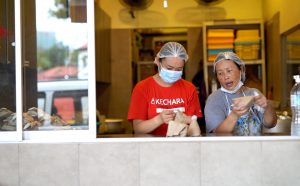 Beyond the homeless, KSK also supports the plight of certain financially struggling households – most notably, those of single mothers.
Beyond the homeless, KSK also supports the plight of certain financially struggling households – most notably, those of single mothers.
In addition to providing a monthly food distribution service to almost 400 marginalised households, KSK also provides training to single mothers, teaching them to sew items such as backpacks and rugs which are then sold back to KSK – all to help them make a simple income.
KSK’s emphasis on data and its willingness to evolve with the needs revealed in the said data, presents itself as a very well-oiled machine – a far cry from images one might naturally conjure up of a soup kitchen. Indeed, it stands as one of many examples of the value of having a soft heart for a good cause, but the hard feet to get the work done. The future is bright for KSK and the communities they serve.
For the Love of the Game
Situation on the Pitch
 The fortunes of Malaysian football over the last three decades or so, is well documented and still hotly debated about to date. Malaysia’s defeat of South Korea to qualify for the Russian Olympics in the year 1980 remains a fabled international milestone.
The fortunes of Malaysian football over the last three decades or so, is well documented and still hotly debated about to date. Malaysia’s defeat of South Korea to qualify for the Russian Olympics in the year 1980 remains a fabled international milestone.
On the national front, a Mokthar Dahari-led Selangor would have been the team to beat in any local tournaments. The Selangor team of once boasted the who’s who of football.
Similar to the national side, while Selangor had met with some successes over the last three decades, they have simply not been able to reach the heady heights of the 80s or early 90s.
The administrators have deployed and employed resources at all levels, yet the sporadic wins are exactly what they are – sporadic as best.
Talents from teams like Selangor, Kedah, Pahang and Johor used to adorn the national team sheet. Today, Syahmi bin Safari stands as a lone Selangor representative in the national side, perhaps equally reflective of the insipid performance of the once kingpins of Malaysian football, Selangor.
Where and why had the consistency of excelling in the game eluded them?
The PEMANDU team investigates.
Malaysia accounts for 0.7% of Asia’s 4.5 billion population. We are a larger nation compared to Japan, South Korea or even Austria. Yet, we struggle on the international front. Closer to home, success at the club levels are however, drawing greater interest and fanbase. Once the giants of Malaysian football and mainstays of football success in the country, the Selangor team has been going through lean times by their standards. Overtaken by other states in their hunt for trophy ware, the state hopes to extract and emulate the DNA of success of the Johor Darul Ta’zim football club (JDT).
JDT anchored by five consecutive back to back Malaysia Super League titles, can be attributed by the professionalism attitudinal process set by HRH Tunku Ismail Sultan Ibrahim – investing in facilities on and off the pitch to bring in foreign players as well as coaches. The club has also partnered up with Bundesliga (Germany) and La Liga (Spain) giants, Borussia Dortmund and Valencia CF respectively. This partnership involves the relevant parties to disclose training information, tactical ideas and the exchange of young players as per their agreement with the Johor side.
As a result of its efforts, JDT is gradually making a mark on international football, reaching as high as 152nd on the International Federation of Football History and Statistics Club World Ranking of the year 2015 – one notch above Southampton FC and AC Milan, with both the English and Italian sides placed at 153rd. It has also established itself as a firm fixture in Asian Football Confederation (AFC) leagues which make up the region’s most prestigious tournaments.
With JDT having experienced the trappings of glory in Malaysian football, other clubs across Malaysia have never been hungrier.
Selangor seeks to return to glory days
 Buoyed by the challenge to chart their footballing fortunes and ensuring their fans are not starved of consistent success on the pitch, the Football Association of Selangor (FAS) has set out on a transformation journey as it seeks to return to its position as Malaysia’s most prolific club. While their local rival club PKNS FC holds the most number of titles in Malaysian leagues, FAS has not won a title since 2015.
Buoyed by the challenge to chart their footballing fortunes and ensuring their fans are not starved of consistent success on the pitch, the Football Association of Selangor (FAS) has set out on a transformation journey as it seeks to return to its position as Malaysia’s most prolific club. While their local rival club PKNS FC holds the most number of titles in Malaysian leagues, FAS has not won a title since 2015.
As Bryant McGill once said, “acceptance is the road to all change”. And having acknowledged their past mistakes, FAS now looks to transform for the better with eyes set on title-winning glory once more.
To kick-off its transformation journey, FAS engaged PEMANDU Associates in August 2018 to develop and facilitate a strategic workshop to chart a five-year transformation plan anchored on five focus areas: administration, the first team, infrastructure, development and revenue generation and management.
The exercise immediately revealed a key pain point – an over reliance on government funding and poor resource allocation as a result. The FAS Transformation Workshop thus sought to identify and implement key strategic initiatives to ensure sustainable growth and success of FAS. Bringing together all the key stakeholders including officials, fans, former players, federal level organisations and private sector representatives, the workshop was able to identify key issues and develop suitable transformation initiatives to meet the association’s long-term ambitions, utilising PEMANDU Associates’ Big Fast Results (BFR) Methodology – 8 Steps of Transformation©.
The five-year road map
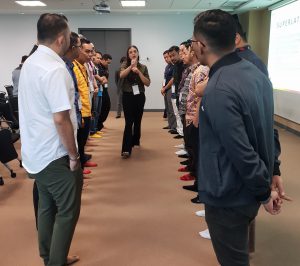 During the workshop, FAS identified several immediate and long-term targets to work towards in the next five years. These included winning one major trophy and consistently qualifying to compete in Asian club football tournaments, achieving a 100% year-on-year increase in stadium attendance, recording yearly sustainable profits and embarking on holistic football development across all age groups.
During the workshop, FAS identified several immediate and long-term targets to work towards in the next five years. These included winning one major trophy and consistently qualifying to compete in Asian club football tournaments, achieving a 100% year-on-year increase in stadium attendance, recording yearly sustainable profits and embarking on holistic football development across all age groups.
Some of the clear targets to be achieved through the five identified focus areas:
Governance
- Streamlining key roles and strengthening FAS’s capacity and capability
- Improving internal controls and processes through the introduction of Standard Operating Procedures and strategic measures
First Team
- Strengthening first team management capacity, structure and capability
- Introducing performance-based contracts
- Improving scouting approach and processes
Development
- Introducing and elite player identification programme
- Enhancing existing development programmes
- Establishing non-player development programme
Facilities and Infrastructure
- Establish Shah Alam Stadium as home ground
- Development of other support facilities
- Ensuring availability of required infrastructure for supporting programmes
Revenue Management
- Enhancing corporate sponsorship offerings
- Developing new commercialisation strategy
- Identifying and developing other sources of revenue
The grassroot interest for football is there. The FAS clearly needs to unlock their potential by way of installing a more driven and professional set up both on and off the field. Football is booming in many Asian nations. Selangor was once regarded the mainstay of national football honors. Major foreign clubs favored playing them during their pre or close season tours, including a young Maradona-led Boca Juniors. Local fans loved the fanfare of seeing their local heroes compete in the cauldron of their famed stadia.
The FAS Transformation Workshop is just the beginning of a long arduous journey but it has demonstrated clear commitment from the top, inclusive planning resulting in a clear long-term strategy to aid in its revival as a title contender in Malaysian football.
It has been some time since the Merah Kuning (Red & Yellow) brigade struck fears into every team that they have played. Being ordinary is no longer an option. The vociferous Selangor football fans are a demanding lot – as with their counterparts anywhere on this planet. It would stand well for FAS to deliver on their promise or risks playing in the backwaters of Malaysian football.
BFR Untold: Working mums. Millennials. The consultants’ lowdown on Budget 2019.
Budget 2019 has been the talk of the nation. We spoke to some of our consultants to get their perspectives on where the new budget is winning, where it can be improved, and their hopes for Malaysia Baharu.
Transformation on the Street: Setting the Economic Agenda for a New Malaysia
Malaysia’s Budget 2019 announced on 2 Nov 2018 has set the pace for the direction in which the country’s economy will be steered by its new government. The budget, which was also the first to be unveiled by the government, was generally well-received by the public for its focus on fiscal discipline as well as inclusiveness and societal well-being of the middle and lower-income groups.
However, with expectations of a slightly higher fiscal deficit of 3.7% in 2018 against an earlier projected 3.4%, as well as lower forecasted economic growth of 4.8% for the year versus between 5% and 5.5% targeted previously, the government has firmly established a New Malaysia that is more cautious than in the past. Given the prevailing global economic and industry trends, this approach may prove prudent as the country strives to remain relevant against a competitive and dynamic landscape. But, what are the essential considerations for the government to develop the economic agenda for the New Malaysia?
Nurhisham Hussein, the Employees Provident Fund Head of Economic & Capital Markets, observed at the Youth Economic Forum (YEF) 2018 recently that the economic environment has shifted considerably in recent times, with the emergence of multiple economic superpowers and greater inter-connectivity among economies. Coupled with a fast-paced landscape driven by tech disruptors, Nurhisham believes that the traditional practice of backing specific industries to achieve growth is no longer feasible. “We need to bet on making ourselves as structurally sound as possible by investing in human capital and ensuring the labour market is flexible and geographically mobile,” he said.
Aside from keeping an eye on trends, policymakers would also be wise to address vulnerabilities within the local economy. These vulnerabilities exist mainly in the form of lower government revenue from the removal of the Goods and Services Tax and the current level of fiscal debt. While Malaysia is recognised for having strong economic fundamentals, such as ease of access to capital and credit, Tan Sri Zeti Akhtar Aziz, chairman of government-linked investment firm Permodalan Nasional Bhd, observed that the government is currently utilising 12% of its operating budget on servicing debt, double that of Malaysia’s peers.
Zeti, who is the former governor of the Malaysian central bank and also spoke at YEF 2018, added that monetary policy around the world sees increasing interest rates towards the normalisation of rates, as global economies are no longer in crisis. To follow suit, Malaysia must first address its level of debt and avoid excesses in expenditure. It is by achieving this normalisation of monetary policy can the country realise fiscal sustainability.

Warning that there is a “tremendous” need to jump-start the economy, she also advised that rather than cancelling infrastructure projects, the projects should be reassessed in terms of their value-add and impact to the economy, society and the environment, as well as cost against global standards.
The country’s economic conditions have also been highlighted by ratings agency Fitch Solutions. In a recent note, it cautioned of a slowing economy resulting from the government’s fiscal prudence. With the external environment remaining uncertain, the government may have limited room to stimulate growth while it seeks to reduce debt. The ratings agency also observed a greater reliance on oil revenues instead of measures to increase other revenue, which will additionally constrain efforts to lessen fiscal debt.
Meanwhile, Dr Sukhdave Singh, a director at Khazanah Nasional Bhd and also a former central banker, highlighted Industry 4.0 as a further point to contend with in establishing Malaysia’s economic trajectory. “We do not have the luxury of time. Industry 4.0 is already here changing the economic landscape and is only expected to accelerate in its intensity and impact. But we’re not ready; we need a national effort,” he warned.
Echoing Nurhisham’s earlier point that the time is past for focusing on specific industries, the government must instead create a nurturing environment for companies to become champions. This will require an intensive knowledge-based economy, a high-quality labour force, modern infrastructure, sound institutions and robust governance. These, in turn, call for deep political will and emphasis on innovation. The country is also urged to collaborate with its neighbours to compete with large economies, leveraging on ASEAN’s resources and market size.
With the New Malaysia still in its early days, the country and its economy remain in a transitional period. However, the prevailing global economy and industry trends signal that time and a balancing act in fiscal prudence are of the essence for the new government to launch a resolute economic agenda.
